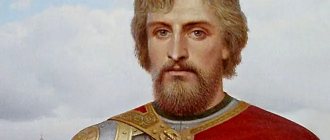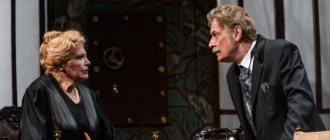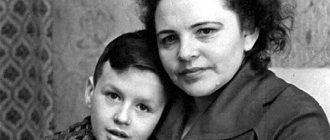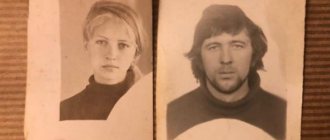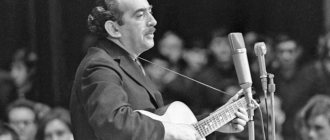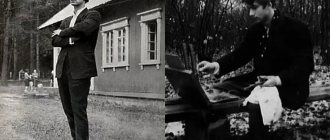Revolutionary in the second generation: the writer’s childhood in the Far East
Alexander Fadeev with his older sister Tatyana. 1907. Photo: molodguard.ru
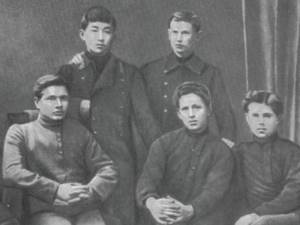
Alexander Fadeev (standing on the right) among the students of the commercial school. 1915. Vladivostok. Photo: molodguard.ru
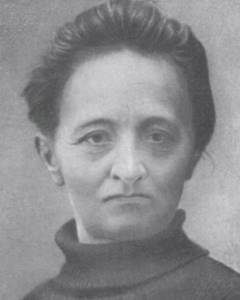
Maria Sibirtseva is the aunt of Alexander Fadeev. 1917. Photo: molodguard.ru
Alexander Fadeev was born in 1901 in the village of Kimry near Tver. His father, Alexander Fadeev, recently returned from exile in the Arkhangelsk province, where he was sent for participation in the revolutionary organization “People's Will”. Mother, Antonina Kunz, was a member of the circle of Social Democrats. Alexander Fadeev recalled: “She was not only a good mother, but also generally a very extraordinary person, with a great personality. Only now do I fully understand what a tremendous moral strength and support my mother was for me.”
The future writer became the second child in the family: a year earlier his older sister Tatyana was born. In search of work, the parents often moved: they lived in Minsk, Kursk, Vilna (today Vilnius). In 1905, another son, Vladimir, was born. Soon after this, Alexander and Antonina Fadeev separated due to political differences. The children remained with their mother.
In 1907, the mother married for the second time. Her colleague, paramedic at the Vilna railway hospital, Gleb Svitych, became her husband. He was the son of a famous Polish revolutionary and feared persecution from the authorities, so in 1908 the family moved to relatives in the Far East. Work was found only in the remote village of Sarovka. There Alexander Fadeev went to school. He recalled: “Floods are the scourge of these places, and Sarovka remains in my memory with huts in the water, with a continuous sea of water. The adults and we guys swam from hut to hut on boats, ... rafts, or simply in troughs in which feed was given to horses and cattle.” Studying was easy for the future writer; he received high grades and praise from his teachers. After lessons, Fadeev and his sister looked after the house and worked in the garden, so there was little free time left: “they mowed, reaped, knitted sheaves, weeded. Since childhood, I knew how to harness a horse, saddle it and ride.”
The parents wanted to give their son a good education, but this was impossible in a rural school. In 1910, Fadeev passed the exams and entered the Vladivostok Commercial School, one of the most prestigious in the city.
In Vladivostok, Alexander Fadeev settled with his aunt, Maria Sibirtseva. She was the director of the gymnasium, which she herself founded, and her husband taught literature there. The Sibirtsevs raised two sons. The future writer said: “I was brought up in this family no less than in my own family.” The Sibirtsevs had a large library, and Fadeev soon became interested in the works of Jack London and Fenimore Cooper. At the same time, the student wrote an adventure story “Apaches and Kumachi” about boys who fled to America. Fadeev also composed poems, essays and stories and published them in the student magazine “General Extracurricular Work”.
In addition to general education subjects, the school taught commercial arithmetic and correspondence, accounting and Japanese. Alexander Fadeev coped with a heavy academic load and after the fourth grade received a certificate for success in his studies.
Pale, with light flaxen hair, this boy is touchingly gentle. He lives some kind of inner life... His works, classroom and home, on literature were original in concept, thorough in content, with the desire to deeply develop the topic. The boy's verbal means were not particularly rich, but the bright colors were amazing.
Stepan Pashkovsky. From the collection “Fadeev. Memoirs of contemporaries"
Guests often gathered at the Sibirtsevs’ house. Most of them, like Vsevolod and Igor Sibirtsev, were revolutionaries. The writer said: “Both of them were very extraordinary people, strong-willed, fearless, very loyal people. I was still young and began to develop as a Bolshevik because I always lived with them and they influenced me.” By 1917, Alexander Fadeev, together with his friends from school, created a “commune”. The students lived in an empty barracks, exchanged clothes and brought all the money into a “common wallet”, from where everyone could take as much as they wanted.
Brief biography of Fadeev
Alexander Alexandrovich Fadeev
Alexander Alexandrovich Fadeev was born on December 11 (December 24, new style) 1901 in the village of Kimry, Tver province (now the city of Kimry, Tver region). Parents - Alexander Ivanovich and Antonina Vladimirovna were active participants in the revolutionary movement.
By the age of four, Alexander Alexandrovich learned to read on his own. In 1905, his parents separated, which was a strong blow for Fadeev. And in 1907, the mother married for the second time to Gleb Vladislavovich Svitych, who was engaged in the further education of the boy.
From 1912 to 1918, Alexander studied at the Vladivostok Commercial School, but, carried away by the revolutionary struggle, he dropped out. Until 1921, he took part in hostilities in the Far East on the side of the Bolsheviks. During this period, he took the pseudonym Bulyga. In 1921 he took part in the suppression of the Kronstadt uprising, where he was wounded. After treatment, Fadeev remained in Moscow and entered the Moscow Mining Academy.
Since 1922, Alexander Alexandrovich began to write. He finished his first work, the story “Spill,” in 1923, and by 1926, while working on the novel “Devastation,” he decided to become a writer. In the same year he married Valeria Anatolyevna Gerasimova. The publication of “Destruction” brings fame and this is where Fadeev’s party career begins. First he worked in the Russian Association of Proletarian Writers, and after its liquidation in 1932, he participated in the creation of the Writers' Union of the USSR. In 1932 he divorced his first wife, and five years later he met Angelina Iosifovna Stepanova, who became his second wife. In 1939, Fadeev took the position of secretary of the Writers' Union and in the same year became a member of the CPSU Central Committee. During the Great Patriotic War (1941-1945) he worked as a war correspondent for the newspaper Pravda.
In 1946, Alexander Alexandrovich Fadeev became the general secretary of the Writers' Union. In the same year, the first edition of the novel “The Young Guard” was published, which was criticized by the authorities for the absence in the work of the decisive role of the party in organizing the underground struggle. Nevertheless, he receives the Stalin Prize. The second version of the novel was published in 1951 and was received favorably by the authorities. In his role as head of the Writers' Union, Fadeev takes an active part in persecuting writers disliked by the authorities. But he also tries to help them. This causes an internal conflict, which for Alexander Alexandrovich results in an addiction to alcohol. In 1956, Fadeev was subjected to strong criticism at the 20th Congress of the CPSU.
Alexander Alexandrovich Fadeev died on May 13, 1956 as a result of suicide in the village of Peredelkino. He was buried at the Novodevichy cemetery in Moscow.
Fadeev during the Civil War: from partisan to party delegate
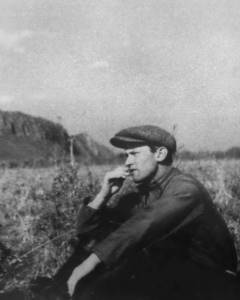
Alexander Fadeev. 1933. Suchanskaya Valley, Primorsky Territory. Photo: novayagazeta.ru
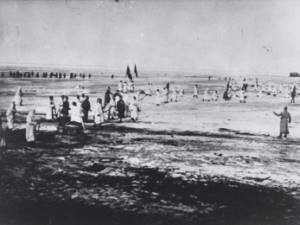
Suppression of the Kronstadt rebellion. March 1921. Kronstadt, St. Petersburg. Photo: Multimedia Art Museum, Moscow
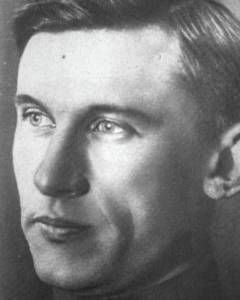
Alexander Fadeev in his youth. 1921. Photo: molodguard.ru
In 1917, the Bolsheviks came to power. However, already in July 1918, the city was captured by Czechoslovak, American and Japanese troops and all supporters of the Communist Party were forced into hiding. Alexander Fadeev joined the RCP (b) and began to help those arrested. Revolutionary Tatyana Tsivileva recalled: “It was necessary almost every day to carry large bales of food and clothing to the concentration camp for our comrades. Then the tasks deepened: helping those who escaped from the camp, placing them in apartments, providing them with documents and clothing.” The city party committee issued propaganda leaflets and newspapers. At first, Fadeev only distributed them, but soon he began to write himself: his appeals were published by the Red Banner publication.
In 1919, Alexander Fadeev was sent to a partisan detachment to fight the White Guards and interventionists. In April of the same year, the future writer was wounded in the battle for the village of Spasskoye. Having barely recovered from his wound, he went on a new mission: to melt down ammunition in the Amur region. Fadeev said: “Flights along Ussuri in 1920 are one of the happiest memories of my youth. I... was still limping, but it was already clear that everything would be fine. Constant tension, danger, our fights with deserters from the army - all this only invigorated the soul.” Soon Alexander Fadeev was appointed commissar of the Amur regiment.
Despite my youth - 19 years old, I had already gone through the school of guerrilla warfare in Primorye, the fight against the Japanese after April 4-5, was wounded, had commissar experience behind me, had a secondary education, was relatively politically literate and was already known as an agitator. mass worker.
Alexander Fadeev. "For thirty years"
In 1921, Alexander Fadeev was elected as a delegate to the X All-Russian Congress of the RCP (b), which was held in Moscow. However, the agenda of the meeting changed at the last moment: the sailors of the Baltic Fleet spoke out against the Bolshevik dictatorship, and the Kronstadt uprising began in Petrograd. The first assault on the fortress by the Red Army was unsuccessful. Then they decided to send the congress delegates to the fighters.
The second assault on Kronstadt ended in victory for the Bolsheviks. During the battle, Fadeev was seriously wounded in the leg. The orderlies brought him to a Petrograd hospital, where the revolutionary was treated for five months. He recalled: “I have never read so much in my life. Here you have utopian socialists, and Lenin, and Milton, and Blok... You read so many things... The doctor was kind, like doctors in general.” After discharge, Fadeev was released from further service. He decided to move to Moscow and finish his education.
“Obviously, I have the ability for this matter”: first works
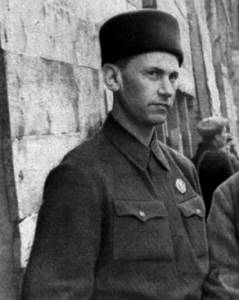
Alexander Fadeev in his youth. Photo: 24smi.org
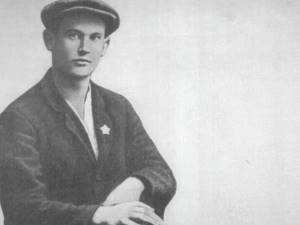
Alexander Fadeev in his youth. 1926. Photo: molodguard.ru
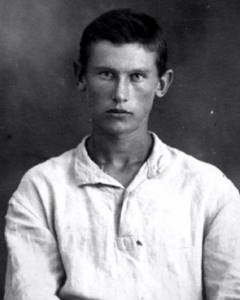
Alexander Fadeev in his youth. Photo: 24smi.org
Throughout the summer of 1921, Alexander Fadeev prepared to enter the Moscow Mining Academy and in the fall he became a student at the Faculty of Geology. Party work distracted him from his studies: the future writer was simultaneously the secretary of the faculty party organization and an instructor at the Zamoskvoretsky district party committee. And from December 1922, Fadeev appeared in classes even less often: the academy’s management introduced free attendance for students who were engaged in social work. Instead of lectures on geology, Alexander Fadeev attended open discussions by Anatoly Lunacharsky or Vladimir Mayakovsky about new poetry, went to the theater and read the literary magazines “Krasnaya Nov” and “Print and Revolution”.
In 1922, Fadeev learned of the death of his cousin Igor Sibirtsev: the civil war in the Far East was still ongoing, and he died in battle with the White Guards. The news prompted Fadeev to write about his native land and the events that took place there in 1917. In 1923, he completed his first literary work - the story “Razliv” about revolutionaries in the village of Chuguevka.
The manuscript depicted an extraordinary nature - with tall cedars, hills, valleys and a wild river, the crushing flood of which was described in this little story. And the people the author talked about were like nature: strong and courageous, passionate and truthful.
Yuri Libedinsky, head of the literary department of the Young Guard magazine
At the same time, the writer conceived the story “Against the Current.” In his diary Fadeev Fr. The writer dedicated “Against the Current” to Igor Sibirtsev. In December 1923, the story was published in the magazine “Young Guard”. A year later, the story “Spill” was published.
In 1924, Alexander Fadeev was sent on a party assignment to the South, and he was forced to leave the Mining Academy. The writer took the post of secretary of the Krasnodar city district committee. In the evenings he wrote: Fadeev came up with the idea for the novel “Destruction” about a partisan detachment during the Civil War. The writer was so carried away by working on the work that he decided to abandon his political career. In 1925, Fadeev moved to Rostov-on-Don and became a journalist for the newspaper Sovetsky Yug.
Fadeev finished the novel “Destruction” in 1926. He carefully prepared the manuscript for publication: he rewrote individual chapters four or five times, shortened and, conversely, added details. The writer said: “I wanted to develop in the novel the idea that there is no abstract, “universal”, eternal morality. Lenin demanded from every conscious worker, every communist and Komsomol member such an understanding of morality, when all actions and actions are directed in the interests of the revolution, based on the interests of the working class.” The plot of the novel differed from other works about the revolution of that time. The partisan detachment in “Rout” did not win any great victories and did not consist only of heroes. Fadeev's characters could make mistakes and doubt, but at a critical moment they were ready to sacrifice themselves for the sake of the common cause. In 1926, “Destruction” was published chapter by chapter by the magazine “October”. The novel brought literary fame to Alexander Fadeev: the work was translated into English, German, French, Spanish and Chinese.
Fadeev Alexander Alexandrovich
(real name is Bulyga)
(1901-1956) Soviet writer
Most modern readers know Alexander Alexandrovich Fadeev as the author of the novels “Destruction” and “The Young Guard”, without thinking at all about the fact that for almost forty years this man determined the entire development of Soviet literature. The dual position that he occupied in literature became the main tragedy of his life, which ended overnight.
The parents of the future writer met in a very unusual way. Alexander Ivanovich went to prison for revolutionary activities. He had no relatives in the capital, but the underground found a way out: they persuaded girls who sympathized with the revolutionary movement to visit prisoners and carry packages for them under the guise of brides. One of them, a student of the Christmas paramedic courses, Antonina Kunz, came to Fadeev one day. Then she visited him in exile, and eventually the young people got married. Three children were born into their family, the middle of whom became a writer in the future.
Alexander Fadeev was born in the Central Russian city of Kimry. He remembered his own father poorly, since his parents separated when the boy was about four years old. In early childhood, he, together with his stepfather, professional revolutionary G. Svitich, and his mother moved to the Far East.
In 1910, Sasha Fadeev entered the senior preparatory class of the Commercial School in Vladivostok. The family soon moves to the distant village of Chuguevka, and Sasha is left alone in the city. He studied diligently, science came easily to him. He read a lot, drew well, wrote poems and stories, which were published in a handwritten school magazine. As a capable student and the son of low-income parents, Sasha received a scholarship. There, at the school, he became close to the Bolsheviks.
In the spring of 1919, Alexander Alexandrovich Fadeev joined the Suchansky partisan detachment, where he rose from an ordinary soldier to a brigade commissar. Much of what he saw and experienced would subsequently be reflected in his novel “Destruction.” In the battles near Spassk, Fadeev was seriously wounded, so he was demobilized and, after treatment, was sent to party work.
A little later, he was elected as a delegate to the X Party Congress and came to Moscow. Here he lived in the same room with Ivan Konev, the future Marshal of the Soviet Union, an outstanding commander of the Great Patriotic War. The young people became friends. Among the congress delegates, Alexander Fadeev participated in the suppression of the Kronstadt rebellion and was seriously wounded in the leg.
Due to health reasons, Alexander was released from military service and began to prepare to enter the Mining Academy, where he was enrolled in 1921. The young people with whom he studied there would, already in the thirties, head the People's Commissariats, the largest construction projects, combines, and factories.
In the early twenties, Fadeev’s stories dedicated to revolutionary events in the Far East began to appear in the magazine “Young Guard”. After finishing his second year, he went to party work in Krasnodar, and then to Rostov-on-Don. He continued to publish and began writing the novel “Destruction,” which soon began to be published in separate chapters in the magazine “October.”
In 1926, Alexander Alexandrovich Fadeev was called to work in Moscow as a famous writer. He actively works in writers' organizations, becoming, in particular, one of the leaders of RAPP, a proletarian organization that gradually subjugated Soviet literature. Social work kept the writer more and more busy, distracting him from creativity. Politics became for Fadeev the same passion as his vocation as an artist. In those years, he believed, and not without reason, that active participation in public life would help him reach creative heights. To strengthen his position, he began to publish articles that were supposed to substantiate the concept of the dominance of one method in literature - socialist realism.
Alexander Fadeev’s first major work, the novel “Destruction” (1927), which explored the theme of the Civil War, became an event in the social and literary life of that time. It was written later than the books by A. Malyshkin, A. Serafimovich, K. Fedin, D. Furmanov and therefore turned out to be more aesthetically holistic both in the elaboration of the main storyline and in the depiction of the characters. The main advantage of the work lay in the psychological depth of the main character - the commander of the partisan detachment Levinson. Of course, the novel was not without its shortcomings; it overly romanticized guerrilla warfare, but this was a tribute to the times.
It was immediately translated into several foreign languages and released in the USA and China. Success strengthened the social position of Alexander Fadeev. In 1930, he was appointed deputy chairman of the organizing committee of the Writers' Union. Together with other members of the organizing committee, Fadeev began preparations for the creation of the Writers' Union, after the First Congress of Writers he joined the board, and a little later became its general secretary. It is noteworthy that he retained this post for the rest of his life and was never re-elected.
In the thirties, Alexander Fadeev published his second novel, “The Last of the Udege,” which he himself considered his best book. He tried to talk about the changes that the revolution brought to the life of Russian society. Perhaps, contrary to the will of the author, tragic notes sound in this work, as well as in “Destruction”. In essence, Fadeev worked on this novel all his life and even during the war years he repeatedly turned to it. However, out of the planned six parts, only four were published.
During the war, Alexander Alexandrovich Fadeev worked as a front-line correspondent for the Pravda newspaper. In 1943, he received materials that told about the defeat of the youth anti-fascist organization “Young Guard” in Krasnodon. In just a year and nine months, the writer created a novel, which was immediately subject to harsh criticism. Fadeev was accused of not showing the role of the party in organizing underground work deeply enough and overly romanticizing the young heroes. It should be said that the writer spent a lot of effort in collecting material: he traveled to Krasnodon several times, worked in the archives, talked with the heroes’ relatives and friends, and carefully analyzed documents.
In 1951, Alexander Fadeev released the second edition of the novel, practically rewriting it from scratch. Some characteristics turned out to be so standard that they resembled common literary cliches. However, the novel was immediately filmed, and the author gained great fame. But we cannot help but mention what has been clarified in recent years: the writer made distortions of historical truth in the work, in particular, he excessively exaggerated the role of the Young Guard commissar Koshevoy and left in the shadow the feat of the organization’s commander, Ivan Turkenich.
At this time, Alexander Aleksandrovich Fadeev begins to write the novel “Ferrous Metallurgy”, again returns to his favorite work “The Last of the Udege”, and works on a collection of his literary critical articles “For Thirty Years”. None of the people close to him felt the approach of tragedy, although it was already making itself felt. He began to drink a lot and became depressed. True, after treatment it seemed that the writer’s peace of mind was restored. But this was only external. The work wasn't going well. In letters and conversations with friends, he insisted that as an artist he had failed.
The personal creative tragedy was aggravated by Fadeev’s social position. As head of the Writers' Union, he was responsible for the bans of works and the arrests of many writers. Alexander Fadeev perceived the death of Stalin as impending retribution, but still remained in his post. Only after Khrushchev’s report at the 20th Party Congress, where he was named among those who shared responsibility for the crimes committed, did Fadeev realize that punishment was inevitable. On May 13, 1956, the writer committed suicide.
For almost two decades, his name was in the shadows, and only in 1974 was the medal named after Alexander Fadeev established, which meant recognition of his enormous organizational merits. However, his suicide letter was published only in 1990. In it, the writer admitted his mistakes and stated that he did not see a way out of the tragic impasse in which he found himself by the will of circumstances.
The personal life of Alexander Alexandrovich Fadeev was also not entirely smooth. Many women loved him, and he knew how to show them the highest degree of decency and spiritual nobility. Fadeev was married several times and had a son and a daughter from different marriages. The writer’s second wife was the famous Moscow Art Theater actress Angelina Stepanova.
Creativity against bureaucracy: an unfinished novel and a post in the Writers' Union
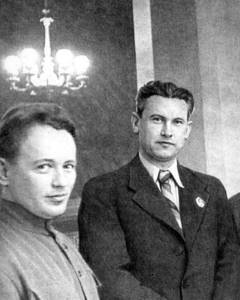
Writers Mikhail Sholokhov and Alexander Fadeev (right) at the XVIII Congress of the All-Union Communist Party (Bolsheviks). 1939. Photo: a4format.ru
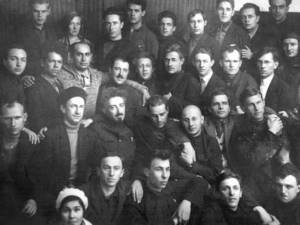
Alexander Fadeev (in the second row, bottom right) at the Russian Organization of Proletarian Writers (RAPP). Photo: wikimedia.org
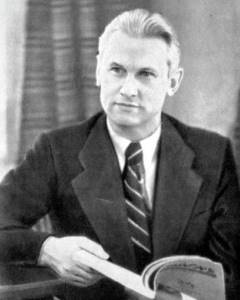
Alexander Fadeev. Photo: literatura5.narod.ru
In December 1926, Fadeev was invited to become the organizing secretary of the Russian Organization of Proletarian Writers (RAPP), and he moved from Rostov-on-Don to Moscow.
In 1927, the writer began work on the novel “The Last of the Udege.” The writer Yuri Libedinsky recalled: “After sitting at the table for eight to ten hours, having a snack and sleeping, he sat down to work again, and again for many hours. This went on for two or three weeks. By the end of such work, he reached almost exhaustion, to general weakness... In the process of this work, he mastered the text so much that he could read entire pages by heart.” According to Fadeev’s idea, the work was to consist of six parts. By 1929, two were ready. The novel took place during the Civil War, but the emphasis was on the future: the heroes, workers and peasants, talked about a new, just world and communism.
The literary association RAPP was created to unite “all proletarian writers” and make literature “an ally of the revolution.” To achieve this goal, members of the organization used various methods, including harassment and press campaigns against dissenters. Alexander Fadeev, as secretary of the organization, publicly condemned writers Boris Pilnyak, Evgeny Zamyatin and Andrei Platonov for criticizing the Soviet system.
There was a lot of paperwork at RAPP, and Fadeev did not have time to write. In 1931, he shared his thoughts with Alexander Serafimovich: “I was thinking about leaving the Secretariat, because I don’t have the opportunity to work there, but I have to be responsible for its affairs... The point is in our work system, which is in no way adapted to working with a writer. We are least concerned with writing and literature.” In 1932, RAPP was disbanded - the Union of Writers of the USSR was created in its place. Alexander Fadeev supported the reform in a series of articles “Old and New.” On the pages of Literaturnaya Gazeta, he analyzed the results of the work of RAPP and criticized the organization. This saved the writer’s life: many members of the Russian Association of Proletarian Writers were accused of Trotskyism and repressed.
In 1933, Alexander Fadeev left for the Far East. Because of his work at RAPP, the writer has not been able to finish the novel “The Last of the Udege” for four years. Fadeev wrote to the poet Vladimir Lugovsky: “I have big plans... I need to finish a novel, write several stories for Pravda, thoroughly study theory and science, and first master at least two languages - German and English.” However, the plan could not be realized. In Vladivostok, Fadeev wrote only the third chapter of the novel. In 1934, the writer was invited to Moscow and appointed deputy chairman of the organizing committee of the Union of Soviet Writers - in fact, one of the leaders of the organization.
At this time, Alexander Fadeev often went on business trips: as a representative of the Writers' Union, he attended ceremonial events in Czechoslovakia, Georgia, Armenia, and various regions of Russia. In 1936, the writer was in Spain and France at meetings of the International Association of Writers for the Defense of Culture.
How to break out of the system. Lessons from Leonid Fadeev
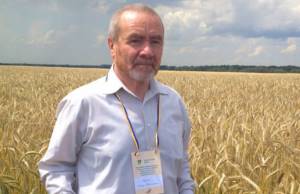
Photo source: from the personal archive of Leonid Fadeev
Changing profession December 19, 2021. 06:29 4656
Around the man-designer of aircraft engines, who later became a breeder and agricultural producer, a wonderful world of unique personalities is constantly seething. He himself is always different, with new ideas, plans (to hell with age!)
If you think that he lives in Kharkov, this is not entirely true - he is constantly on the move: to enterprises, fields, exhibitions, dozens of conferences and symposiums, often foreign. Leonid Fadeev is an engineer, officer, teacher, entrepreneur and, undoubtedly, a philosopher.
We talked for almost two days during the agricultural exhibition. But there wasn't enough time. Leonid Vasilyevich added, smiling: “You turned me inside out.” However, it is extremely difficult to write about it: you are afraid of missing something important, and everything important is important.
According to the logic of his generation, he could well have become an inveterate “scoop”, a product of a regulated society. An officer, a real colonel. It turned out the other way around. Although here’s what’s surprising: Fadeev was never a rebel either. Well, or this is some special way of protesting against the callousness of the “scoop”.
To talk about Fadeev means to talk about an entire transitional era.
High bar
“The teacher came into the class and spoke casually to my classmate in English, he answered. I didn’t understand anything, but I checked with a friend about the short and lively conversation. It turned out that last night they met in the theater, and today they exchanged impressions. My classmate spoke the language at the level of fluent conversation already in the 7th grade. For me it was fantastic,” recalls Leonid Fadeev, who happened to study at a school in a closed regime city between Nizhny Tagil and Sverdlovsk.
There was a center for the enrichment of uranium ore, which was led: in science - by the famous physicist Igor Kurchatov, in terms of regime - Lavrentiy Beria. On the one hand, the best minds of the country, advanced scientists were concentrated in a small area, and on the other hand, tens of thousands of prisoners were used in the construction of ultra-modern facilities.
The school was attended by children of intellectuals with prominent surnames. Their home libraries numbered thousands of volumes. “My school friends were born and raised in highly intelligent families. I could not have had comparable potential. I felt like a gray mouse,” shares Leonid Vasilievich.
His father, an engineer, was evacuated to this site during the war. My mother died early and was raised by my stepmother, an official who selflessly devoted all her working time to party work. Leonid and his two brothers grew up in absolute discipline and strictness. The boy had no envy. But there was an understanding that his mediocre school grades were absolutely deserved, that his peers were much stronger and that there was a level much higher than his personal one.
The system hinted
In the regime city there was a special school that trained specialists in servicing nuclear installations. My father advised me to study there. But then it was necessary to stay in a closed area. And Leonid escaped to Sverdlovsk, entering the school at Uralmashzavod. The technique was clear, interesting and exciting. It was especially flattering that the young students were entrusted with practicing immediately, from September 2, on a real working machine. “I even painted it with love,” recalls Leonid Vasilyevich.
With the opening of a new workshop for hydraulic machines, the master assigned the best students to the most powerful and precise machines, entrusting complex parts. Responsibility and prestige inspired me, supported by a decent salary. It became obvious to the guy, accustomed to his successes, that the parts that fell into his work could actually be done much easier and faster. And he bypassed the technological map. Youthful maximalism did not take into account the authority of an entire department of technologists who scrupulously wrote down the instructions. This made it possible to reduce the time needed to manufacture the part and eliminate defects.
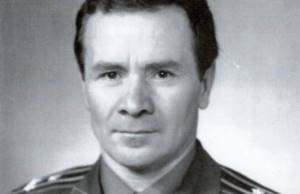
Photo source: from the personal archive of Leonid Fadeev
Although he paid for the initiative. A special rate adjuster monitoring the processes in the workshop quickly adjusted the standards, as a result of which the prices for piecework payments became lower on those machines where the work was performed... faster. There was another way to equalize: when the monthly norm was reached, the route sheets were closed, say, after the 20-25th. The remaining output was carried over to the next month's figures. It was not possible to record superiority in the quantity of manufactured products and get more payment for it.
It even came down to direct threats. Two impressive men appeared in the workshop and approached a short 18-year-old enthusiast, cheerfully cutting a new part, and clearly explained: the entire neighboring workshop has been making such a part for a long time, but much more slowly, in the old fashioned way, and your rationalization will cut our quota, lower payments. So don’t be stupid, don’t go out - follow the route, otherwise you won’t be happy.
The system resisted innovation. She made it clear: standing out is not profitable.
Fadeev learned his lesson. I didn't protest. But, it seems, he did not obey. Over time, it will install a professional elevator for employees at its own production in order to immediately recognize the best, out-of-the-box thinkers and give them the opportunity to grow. Approved hourly payment instead of the standard monthly rate.
Turn an obstacle to your advantage
However, the brainy student was noticed. At a critical moment, when it was necessary to urgently complete the order, Fadeev was entrusted with the work. The emergency was aggravated by the absence of a replacement, who went on vacation, and the illness of his partner. Leonid stood at the machine for 26 hours. Workpieces were constantly being fed to him by tap. It was impossible to stop so as not to disrupt the important assembly.
“When I finally went outside, the streetlights were literally blurry. And I understood the phrase “finalize until the green light,” recalls Leonid Vasilyevich. He says he is deeply grateful to such harsh practice. Because he can always approach any machine and confidently assess what is happening and what to do next.
At the age of 20, he became a foreman in a workshop with dozens of machines for various purposes. “I was surprised by my first salary as a foreman. It seemed strange that it exceeded the working one, because I didn’t make a single detail! - Fadeev smiles at his naivety, who then believed that only the specific iron that lays on the receptionist’s desk is valued with money. “Understanding the value of a manager came later.”
Entered the evening department of the Ural Polytechnic Institute. I didn’t even think about going to a hospital; I felt like a confident professional worker. “But ambitions appeared: I realized that I could do more,” says Fadeev. I began to consider myself accomplished. On my first vacation I could afford to fly by plane to distant, warm Gagra.
But comfort and warmth very soon gave way to cold barracks in the former royal stables. The sanitary checkpoint, Dutch ovens, the difficult search for a hat of the right size... I served for two years as a turner in an air regiment near Tula. Not without trials. For example, we had to restore the plane in a critically short time after a minor accident, to cover up the obvious oversight of a careless political officer. They worked 18 hours a day, but they even delivered two days ahead of schedule.
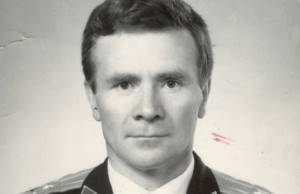
Photo source: from the personal archive of Leonid Fadeev
After being pretty tired of the barracks and dorms, I enjoyed the fact that the family moved to Ukraine, to Cherkassy, after my father’s retirement. Here, already in civilian life, Leonid got a job at a factory and continued his studies at the institute. Together with a friend, we won a competition for the optimal solution to a complex economic problem at an enterprise. The management promised a large bonus for the rationalization proposal; the purchase of the then hit car, the Moskvich, seemed quite realistic.
But according to Soviet custom, the bonus was cut. And only his colleague was left to seek the well-deserved reward, because Fadeev was again called by the military registration and enlistment office. Sent to serve in Germany. As always, I found a positive moment: a new opportunity to work with aircraft appeared. It was only striking that superaviation had a primitive service infrastructure. There was a reason to intervene - Fadeev proposed improvements so that routine maintenance on aircraft would be more efficient and more convenient for the craftsmen.
The chief engineer, a seasoned lieutenant colonel, began addressing 25-year-old Fadeev by his first name and patronymic. “And it has become a habit for me to study. So much so that I could no longer stop. My documents were accepted into the Kazan Aviation Institute. I had to combine study with service in Germany,” says Fadeev about the difficult process of obtaining qualifications as an aircraft engine designer and about a special test of strength.
Self-discipline
“I strictly prescribed a strict regime for myself: 8 hours of work, 4 hours of study. Daily. I did the tests with a reserve. I was very dependent on the timing of obtaining a visa to travel to the sessions. And for any mistake or tardiness they could easily be expelled from the institute. Sometimes I took exams ahead of schedule, every day, in order to have time to return to the unit. It felt like I was teaching myself. And this was a real thrill!”
Training and sports, which Fadeev has been doing all his life, helped him keep himself in good shape. He especially loved all-around and became a candidate for master of sports. Thanks to sports, I also found a wife. I met her, a doctor, in the hospital, where he ended up after spraining a ligament at a regular competition. Together they raised two daughters, and now they babysit their grandchildren.

Photo source: from the personal archive of Leonid Fadeev
In the last years, the teachers, imbued with respect for the practical student, took the opportunity and asked Fadeev: what was it really like in the regiments? The thesis project was defended on a specific invention under the guidance of authoritative scientists.
After the army, I was the head of a laboratory; I liked not only experimenting, but also organizing people for research work. Served as a military representative of the design bureau of the research engine plant in Kaluga. Received an officer rank. But when another summons arrived from the military registration and enlistment office, I decided that this was simply absurd! After all, he had already spent three years as a soldier and three years in Germany. At stake were the most interesting work with leading scientific authorities and our own research. The military commissar reminded him with intelligible obscenities of the duty of an officer, but gave a two-week delay to complete the experiments. Even petitions from scientific authorities did not help. Fadeev was assigned to a distant air regiment in the Russian outback.
Someone would give up, but not him. I used my free time to prepare my PhD thesis. He studied languages, classics of philosophy, which a practicing engineer had never gotten around to before. While adjusting engines in my service, I discovered certain dependencies, made changes, analyzed them, and built graphs. He shared his observations in an article for the Aviation and Cosmonautics magazine. The article found its way to the military department at the Ufa Aviation Institute, where he was later invited to work. “I was lucky to have professionals who were passionate about science. It was they who advised me to take a risk and try to enroll in the adjunct program at the Air Force Academy. Zhukovsky."
In the Soviet army, except for Fadeev, there was not a single officer who would apply for an adjunct post, having zero military education, even without an institute military department. And it’s clear that it won’t happen anymore. Fadeev successfully graduated from it, received the academic degree of Candidate of Technical Sciences and the title of Associate Professor.
It's never too late to start
Kharkov, where Leonid Vasilyevich later headed the department of aircraft engine design at the Aviation Engineering School, has long become his hometown. He took up his teaching work deeply and thoroughly. But the result was disappointing: he, an experienced engineer and already a colonel, gave his best, everyone listened attentively, but then gave weak answers in the exams. The essence of exact science was learned only by the most diligent 10 percent. This is fraught for future engineers.
“Look for the answers in yourself,” said Fadeev and went back to study. I found the best authority at that time in modern teaching methods - the innovative teacher Viktor Shatalov - and asked to see him for a training cycle. “I believed him,” he recalls. “I listened greedily, watched, went to Shatalov’s classes at school, and went to bed at two in the morning every day. I understood the essence of his method of reference signals and began to apply it in my classes, completely changing the learning process. And then everything changed. I saw interest and understanding in the eyes of the students, and got the desired result from them in the exams.”
It is not surprising that even now, after any speech by Leonid Fadeev, there are immediately many like-minded people. People remember him and strive to continue communicating with him. He speaks quietly and captivatingly. And he never writes ready-made texts.
“Suddenly, fate, absolutely incomprehensibly how, sent a man to my department with a strange request for me - to save the domestic sunflower selection. I was offered a completely new version of my actions in a completely new environment.”
However, was it really by chance that they came to Fadeev for help? We dare to suggest that no. After all, he was already an authoritative specialist, a recognizable teacher and active in public life, part of the group of Kharkov democrats during perestroika. You can see his photographs with Alexander Yakovlev, Boris Yeltsin, Mikhail Gorbachev.
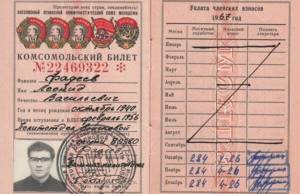
Photo source: from the personal archive of Leonid Fadeev
It was natural to turn to such an influential person for help. In turn, this dramatically changed his own life. The year was 1995. He was 55, and one could calmly think about a well-deserved colonel's pension. “A quiet life makes me feel uncomfortable,” Leonid Vasilyevich laughs. - My head stops working. You need to throw something into it so that something interferes. Otherwise the gears won't turn. Resting on a personal plot is not for me. I planted trees there and abandoned them.” I did not consult with anyone. He left the department and the army. Came to the agricultural sector.
Seeds needed a physicist and a designer
Fadeev was encouraged to start his story from scratch by passionate professionals, in particular, breeders A. Gumenyuk and V. Kirichenko. And he got carried away. So much so that he became the co-author of a new sunflower variety with a self-explanatory name - Ranok. For him it was a symbol of the beginning of a new life. The process was studied, as always, to the smallest detail and deeply. As a result, we managed to obtain the first solid batch of super-elite with a price of 50 thousand/t. “I didn’t sleep at night with the realization that I was becoming a millionaire and that I would make my partner agricultural producers just as successful.”
We bought the best cleaning machine that everyone recommended: cool, brand new, smells like paint. And suddenly at the exit they realized that the seeds were damaged. Multiply these and you will turn into a beggar. The purification was carried out almost manually. They calculated that the losses exceeded the cost of the car.
Then Fadeev again included a physicist, mechanic and designer with many years of experience. Calculations and research of our own optimal equipment, which would help the seeds to carefully, efficiently undergo cleaning and calibration for the maximum number of fractions, took years. So that the villager can make the most of all their potential capabilities and make a good profit.
“Now I give people a tool with which they can improve the efficiency of land use without reducing its natural fertility. I show which seeds nature has made stronger than others, and how exactly to isolate them from the total,” explains Fadeev.
Fadeev's gentle fractional system
For more than 20 years, he has developed and patented many new components and mechanisms, technologies that help protect and not injure seed material and select the strongest seeds for sowing. The results were stunning. For example, on a pneumatic vibrating table with sieves of our own design, I recorded a doubling of productivity. This figure has now been exceeded.
The Kharkov enterprise of Leonid Fadeev produces machines, gradually adding more and more new links to complete the technology. One of the latest machines is an aspirator, which allows you to remove all impurities at the same time as harvesting any grain, without damaging the seeds, in large volumes, from 30 to 100 tons. The pre-sowing technology was completed with a two-component dressing, because modern seed preparation requires various microbial preparations, so combining them is unacceptable .
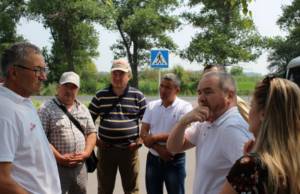
Photo source: from the personal archive of Leonid Fadeev
While many arrogantly nodded at Fadeev’s seemingly homemade systems, he patiently, using live examples, showed the superiority of seeds that had undergone his processing. Now his installations work both for small farmers and strong middle peasants, as well as for large farms. By the way, including where seeds from global brands are processed.
The author is especially proud that his technology is being implemented by innovative farms that are switching to organic farming, even holdings with tens of thousands of hectares. Fadeev’s equipment is also ordered by foreign partners.
After getting acquainted with Fadeev’s conclusions, many were upset: they couldn’t get rid of already acquired fashionable and expensive imported equipment. “And it’s not necessary,” answered the enterprising inventor and proposed a compromise: in the finished complex, to begin with, replace only individual sections, for example, install innovative Fadeev sieves. This is cheaper, but the desired effect is achieved.
“For now, this is a new direction for us, so I didn’t take money from clients who decided to try it until they were convinced of the effectiveness of our implementation,” says Leonid Fadeev. — I write out an invoice for replacing standard sieves on imported machines, and they pay us for the work after they receive a specific result. And we don't lose."
“Today, gentle fractional seed production technology has neither geographical nor time restrictions for implementation. The 21st century will follow exactly this path. There is no other way out,” Leonid Fadeev is sure.
Think big
Seeds obtained thanks to Fadeev’s technology exceed existing world standards in several categories. So why bother once again if market norms do not yet require it? It would be logical to stop and wait for the adoption of new standards. But they won't exist until the new technology spreads more widely. It would seem like a vicious circle. But not for innovators: “A person must have a goal that goes beyond his life. Global. It would even be more correct for his children and grandchildren to pick it up. I am sure that gentle technology will develop and will not be picked up by more powerful companies. And I give them a tool for implementation,” says Fadeev.
LEONID FADEEV, FIRST PERSON:
About business
1. Business should bring joy. I'm proud of him. It’s easy for me to talk about this, because I see the demand for what I offer. I did something new myself.
2. Businesses must set themselves a new challenge every day. It can be different: design, organizational, marketing. The task will advance the entire project: the head is constantly working, changes are constantly being made.
3. The purpose of business is money. Without this there will be nothing else. But if money comes first, business will not happen. Do the job - the money will appear.
About finances and salary
Finances are of great importance. I consider myself wealthy enough not to limit the possibilities of self-realization. The attitude towards money is an important point, an indicator that shows where in a person the human turns into an animal.
Part of my team receives, in addition to salary, a bonus component from the efficiency of our work. Their task is to organize the process and correct what has already been created, to think through the prospects.
The next level is the performers. Among the workers of our enterprise, more than half have higher education. I have an additional director’s fund, my personal money, which I allocate to encourage work and effort when I see a desire for creativity beyond the mandatory functional responsibilities. The workers are not only impeccable performers, but they also come and offer something new. Now the company has three such workers with a monthly incentive amount from me personally. Among them I already see at least one for whom I will provide a lift, upward growth, up to the role of co-founder in another company.
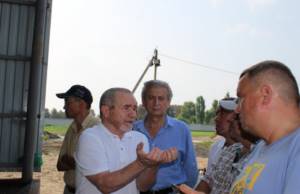
Photo source: from the personal archive of Leonid Fadeev
In general, the issue of co-founding is a chance for people in the team to strengthen themselves at a level of absolute trust; it allows them to feel like owners.
The average age of employees is up to 35 years. Everyone is paid hourly. Time is a category that can be regulated. Anyone can leave during the working day, but they know that during this time they will not receive anything. But overtime work adds a pay factor. Strict accounting is in effect based on qualifications. Inflation must be taken into account. Adding the coefficients gives a salary increase.
Over the past three years, the company's annual turnover has doubled. Positive development ensures that we offer products that have a competitive advantage. Then the crisis is not so noticeable.
About the ability to promote a product
My Kharkov enterprise “Spetselevatormelmash” gradually began to expand beyond the boundaries of a small enterprise. But for now I think this is the optimal form. Therefore, I opened another one, in which the emphasis is on advertising activities, the promotion of our products.
Modern research proves that in a business success system, a good idea accounts for 5-10%, and organizing production based on a competitive idea accounts for 15-20%. But another 70-80% comes from competent promotion of this offer on the market. You can moralize about the fact that the packaging is more expensive than the contents, but you have to accept this as a given and learn to play with new cards, otherwise they will be beaten by more modern competitors. I haven't mastered all the nuances of the new game yet, but it's a task I'm working on. And it is precisely for this reason that I recruit new young, enterprising people as co-founders.
About work schedule
I hire people without any selection, everyone who comes. We started with 6 employees, now there are more than 30. At the same time, in recent years there have been only a few accidental ones: some went to work, others became bartenders. We don't take it back on principle.
I make no comments on discipline. No one is even a minute late, although there is no strict control. The working day is from 7:30 to 16:00, that’s what the majority wanted. I have never seen a single lazy person. If I want to cheer myself up, I go to the workshop, to production, and get treatment.
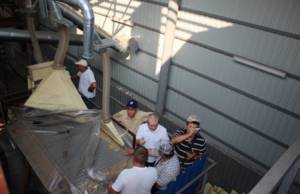
Photo source: from the personal archive of Leonid Fadeev
I never reject a single vacation request, despite my workload. Because I understand that vacation is always connected with family and children. Our employees are family friends.
About danger
It is dangerous to improve machines that are in a dead-end direction. Then the creator of the machine is captured by his own wrong decision. I am glad that I was convinced in time: it is, in principle, impossible to create a universal seed cleaning machine that would meet absolutely all tasks. Versatility in this case will never answer all problems in grain cleaning.
When I found myself at this impasse, I realized the need to create modules from which I could assemble any machine depending on the functional tasks. The module must have deep adjustment so that it can easily solve the problem of each individual owner on any crop.
This approach has opened up completely new horizons both in terms of use on different crops and in ease of operation. The main thing is that we focus on very precise execution of tasks and the final result.
The machines of the future will definitely have deep adjustments in order to operate in strictly efficient modes to save money, increase productivity, and efficiency. The optimal operating mode of the machine is an essential component of its operation.
About different generations
100 years ago, each generation told the next: do as I do. Today a new information volume has been created. And in it, young specialists have advanced significantly further than the previous ones. For example, I look at IT people as people from another world. They speak their own language and I cannot interfere. But they are the ones who determine the movement of progress. This new component has a depressing effect on the generation that has already lived most of their lives, adding to them the psychological discomfort of not being in demand in the new time.
But if you have a global mission that you are going towards, then advanced IT specialists need to be involved in it. With their potential they will help move towards the goal towards which you, the ideologist of this goal, are going. This is the demand for me and my generation.
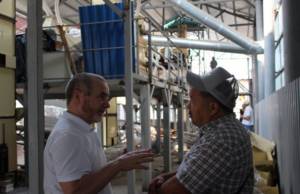
Photo source: from the personal archive of Leonid Fadeev
Intermediate victories are important, from step to step. Confidence in movement comes from winning the previous stages. This way you remove the fear of risk, you know that you will succeed, because it has worked before. You remember any success.
About errors
Mistake is a natural part of any progress. I also had many mistakes and defeats. There were failures too. And that's okay. They should be.
Any success is a corrected mistake. This is a principle of life, a step forward that gives an emotional surge. It couldn't be any other way.
On the way up, intermediate reflection is necessary. Otherwise, you can get caught up in the wrong choice of concept and try to improve your own mistake. It is a prisoner of one's own misunderstandings. You need to try to get out of it.
About freedom
A short word: I am the main component of freedom: I act, I decide, I am personally responsible for everything. The goal of freedom is the full realization of the potential that exists in a particular person. Man today is by nature endowed with the ability to be free, no matter in what area or sphere.
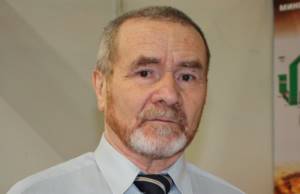
Photo source: from the personal archive of Leonid Fadeev
You create a volume of life in which it is possible to fully realize what you can. It is clear that the direction of this implementation should be in demand. Otherwise, who needs realization into emptiness?
Happiness is a short stage of jubilation from an achieved goal. The more difficult the road, the more delightful the happiness. This is the meaning of life - in movement.
About new advanced
I see less primitivism in today's business-advanced people. Previously, they stuck out their crimson jackets, then showed chains on their fingers. Now, more and more often, businesses are weeding out precisely those who achieve material well-being through their intellect. I really feel this about my current partners.
About dictators
I was always trying to escape from dictators. It is useless to fight them. When there is a dictator, a circle forms around him, which, without the knowledge of the dictator himself, decides who needs to be eaten. The sycophants eat all the unwanted ones themselves.
About the negotiations
Between two negotiators there should always be two advantages, mutual benefit. Only then is the result reliable, will last for a long time and will have a future.
Trust is becoming more and more dominant in relationships between people.
About family
New times are also changing the understanding of the role of the family. My deep conviction: a modern family should create people with competitive advantages. Competitiveness has reached the interpersonal level.
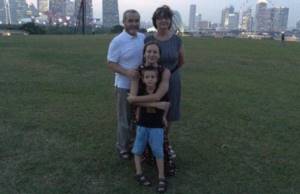
Photo source: from the personal archive of Leonid Fadeev
The concept of professionalism comes first. The market selects professionals. To be in demand, you need to have the appropriate level of professionalism, otherwise you will lose. Everything else is subordinated to this priority. It is important to educate by personal example. It's even better if you can transfer your business. And it’s absolutely wonderful if you can leave your name. Then you already consolidate social recognition of yourself. It can be inherited.
About the name
In the Soviet tradition, it was not customary to mention the names of specific authors in inventions and patents. The system resisted this. Inventions were attributed to teams of 15 families and entire institutes. In the world, it is customary to leave your name to history. Like John Deere, like Xerox. But everything is very logical: WE are not clear who, but I am clear. WE will never blush, and I am responsible for everything. In business, I am more important.
A name is already a civilized business. An idea can never belong to a team. It can belong to one person. It is fixed in one head. I have a thought - this is only my property. If I voiced it to the team, then I am already responsible for everything and am the driver towards the goal that I voiced. Implementation is a matter for the team.
About the movement
If we do today as we did yesterday, then tomorrow we will fall behind and live worse. This is the basis. Therefore, every day you need to do something new, a step forward. Otherwise we will drag the old from the past to the present.
About future
My motto can be called words from Winston Churchill's last speech. He, already very old, was invited to speak at the university of his hometown in front of a huge crowd of people. And he said the most significant thing, in which the wisdom of his entire long life was concentrated: “Never, never, never, never give up.” This was quite enough to go down in history.
Irina Sadovaya,
Personal life: two marriages of Alexander Fadeev
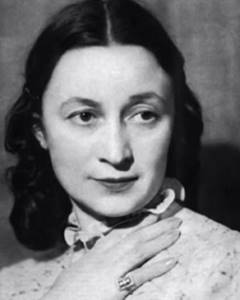
The second wife of Alexander Fadeev, Angelina Stepanova. Photo: lenfilm.ru
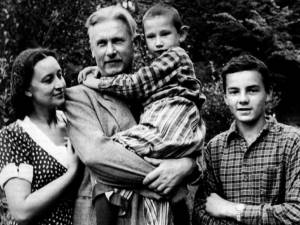
Alexander Fadeev and Angelina Stepanova with their sons Sasha and Misha. Photo: aeslib.ru
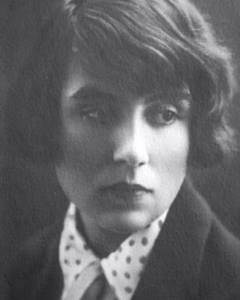
The first wife of Alexander Fadeev, Valeria Gerasimova. Photo: wikimedia.org
Alexander Fadeev was married twice. He met his first wife, writer Valeria Gerasimova, in 1923 at the editorial office of the magazine “Young Guard,” where he tried to publish his novel “Destruction.” Gerasimova recalled: “I can’t say that this tall man in a tunic seemed handsome to me. But in the whole warehouse... there was something that struck me... This figure emanated not only a truly masculine or athletic spirit, but most likely a hunting acumen.” For several years after the meeting, the couple lived in different cities: Fadeev was first in Krasnodar, then in Rostov-on-Don, and Gerasimova was in Moscow. They got married in the early 1920s and lived together until 1929. In 1932, the couple filed for divorce.
The writer's second wife was actress Angelina Stepanova. In 1936, when Alexander Fadeev was with a delegation in Paris, the Moscow Art Theater troupe came on tour to France. The writer saw Stepanova on stage and approached her after the performance. Upon returning to Moscow, he proposed to the actress. Fadeev adopted Angelina Stepanova’s son from his first marriage, and soon the couple had their own child, Mikhail. The writer wrote: “My wife... is a very talented actress, who devotes her entire spiritual life to this favorite activity. In everyday life, she bears little resemblance to an actress in the usual sense; she is a big family woman, loves children passionately, dresses simply, darns her husband’s socks and nags him if he drinks an extra glass of vodka.”
Personal life
Alexander Fadeev was married twice. The first choice of the writer was Valeria Gerasimova, also a writer. The personal life of Fadeev and Gerasimova did not work out, and this marriage soon broke up.
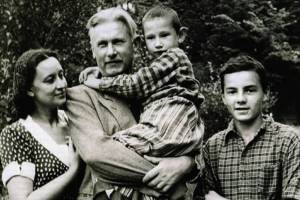
Alexander Fadeev with his family
In 1936, Fadeev married for the second time. The writer’s second wife, artist Angelina Stepanova, gave Fadeev sons Alexander and Mikhail.
It is also known that the writer had a daughter, Maria, whose mother was the journalist and poetess Margarita Aliger.
The Great Patriotic War and two versions of the novel “The Young Guard”
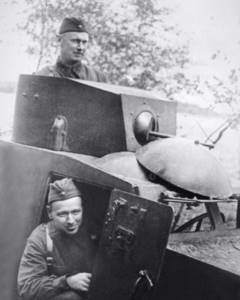
Alexander Fadeev (at the tower) and writer Mikhail Sholokhov. September 1941. Western Front. Photo: Mikhail Kalashnikov / wikipedia.org
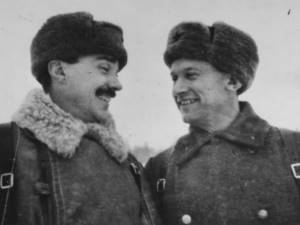
Writers Sergei Mikhalkov and Alexander Fadeev (right). January 1943. Velikiye Luki, Pskov region. Photo: Sergey Korshunov / Multimedia Art Museum, Moscow
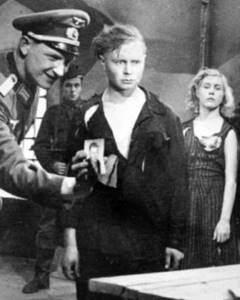
Still from the feature film “Young Guard” by Sergei Gerasimov (1948)
During the years of the Great Terror, Alexander Fadeev tried to help many repressed writers. In 1937, he publicly swore with his party card that the writer Yuri Libedinsky was an “honest communist” and did not support Leon Trotsky. This did not help: Libedinsky was expelled from the party. A similar situation occurred with the Hungarian poet Antal Gidas: despite Fadeev’s speeches, he was sentenced to four years in prison.
In 1938, Fadeev was elected general secretary of the USSR Writers' Union. In December of the same year, Stalin personally invited the writer to celebrate his 60th birthday. In 1939, Fadeev became a member of the CPSU Central Committee.
Since 1941, he worked as a war correspondent for the Soviet Information Bureau and the Pravda newspaper. In the book “Silhouettes,” Boris Polevoy recalled: “Once upon a time, he, among the delegates of the party congress, with a rifle and a couple of grenades in his hands, ran across ... the ice of the Gulf of Finland to the forts of the rebellious Kronstadt. And now he has declared that he wants to see a genuine war, even if he does not give a single line of correspondence.” The writer visited the Western and Kalinin fronts, and in 1942 Fadeev flew to Leningrad twice and wrote a series of essays about the heroic defenders of the city, “Leningrad in the Days of the Siege.”
At the beginning of 1943, Soviet troops liberated the Ukrainian city of Krasnodon. At the same time, it became known about the youth underground organization “Young Guard”, whose members fought against the Nazis. In September, five Young Guards posthumously became Heroes of the Soviet Union, and another 45 young fighters were awarded combat medals. Soon the Komsomol leadership turned to Fadeev with a request to write a book based on this story. The writer recalled: “The fact that I wrote this novel, I am primarily indebted to the Central Committee of the Komsomol, which put at my disposal enormous materials from the commission that worked in Krasnodon after its liberation, long before these materials were published in print.” Alexander Fadeev himself was in Krasnodon: he met with relatives and friends of the victims, and visited the basement where the Young Guard meetings were held. He studied the materials carefully. He left notes on the sheets and put them in separate piles according to topics - “in the speech of the hero,” “appearance,” “very important.” The story ended with the death of the main characters. Shortly before the Soviet offensive, the Germans discovered the organization and killed most of its members.
In 1945, the novel was ready. “Young Guard” was published chapter by chapter in the magazine “Znamya” and the newspaper “Komsomolskaya Pravda”.
The thing, one feels, is large-scale, the exposition is leisurely, wide... The gradual escalation, the increase in anxiety and misfortune is done skillfully and strongly... Fadeev began to write better. Better"
Vsevolod Vishnevsky, writer
In 1946, director Sergei Gerasimov staged a play based on the novel “The Young Guard”, and soon began filming a film of the same name. However, the creative process had to be stopped: in 1947, the newspaper Pravda published an editorial criticizing the novel. The writer was accused of not paying enough attention to the role of the party. Joseph Stalin personally expressed his dissatisfaction with the novel to the writer. He instructed Fadeev to rewrite the work. The processing took three years. The writer said: “I am converting the young guard into the old.”
However, Fadeev had to correct not only this. The underground organization in Krasnodon was exposed due to the testimony of one of the fighters: he was tortured, and he betrayed other Young Guards. This was the only hero of the novel for whom Alexander Fadeev came up with a name; the rest remained under their own. The identity of the Young Guard traitor was easily revealed - Viktor Tretyakevich was the only one not mentioned in the novel. Attacks began on the Tretyakevich family: the mother was not allowed to go to her son’s grave, the brothers were removed from work. However, at the end of the 1940s it became clear that the Young Guard was not a traitor: he was slandered by the investigator. Moreover, it was Viktor Tretyakevich who was the commissar of the entire Young Guard.
Creation
Beginning of literary activity
Alexander Fadeev wrote his first serious work, the story “Spill,” in 1922-1923. In 1925-1926, while working on the novel “Destruction,” he decided to become a professional writer. “Destruction” brought fame and recognition to the young writer, but after this work he could no longer pay attention to literature alone, becoming a prominent literary leader and public figure. One of the leaders of RAPP.
Further literary work
The action of the early works - the novels "Destruction" and "The Last of Udege" - takes place in the Ussuri region. The issues of “Destruction” relate to issues of party leadership; the novel shows the class struggle and the formation of Soviet power. The main characters are red partisans, communists (for example, Levinson). Fadeev’s next novel, “The Last of Udege” (parts 1-4, 1929-1941, unfinished), is also dedicated to the Civil War.
Fadeev is also known for a number of essays and articles devoted to the development of literature in the conditions of socialist realism.
The “Minister of Writers,” as Fadeev was called, actually led literature in the USSR for almost two decades. He had almost no time or energy left for creativity. The last novel, “Ferrous Metallurgy,” remained unfinished. The writer planned to create a fundamental work of 50-60 author's sheets. As a result, for posthumous publication in Ogonyok, it was possible to collect 8 chapters onto 3 printed sheets from the drafts.
Novel "The Young Guard". Truth and fiction
Fadeev took the idea for his book from the book “Hearts of the Brave” by V. G. Lyaskovsky and M. Kotov, published in 1944. In 1945, immediately after the end of the Great Patriotic War, Fadeev sat down to write a novel about the Krasnodon underground organization “Young Guard”, operating in territory occupied by Nazi Germany, many of whose members were killed by the Nazis.
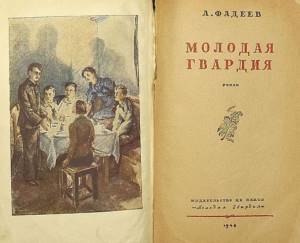
Title page of one of the first editions of "Young Guard"
In mid-February 1943, after the liberation of Donetsk Krasnodon by Soviet troops, several dozen corpses of teenagers tortured by the Nazis, who were members of the underground organization “Young Guard” during the occupation, were extracted from the pit of mine No. 5 located near the city. And a few months later in “Pravda” “Alexander Fadeev’s article “Immortality” was published, on the basis of which the novel “The Young Guard” was written a little later
The book was first published in 1946. Fadeev was sharply criticized for the fact that the “leading and guiding” role of the Communist Party was not clearly expressed in the novel and received severe criticism in the newspaper Pravda, the organ of the Central Committee of the All-Union Communist Party of Bolsheviks, in fact from Stalin himself.
Fadeev explained:
I was not writing a true history of the Young Guard, but a novel that not only allows, but even presupposes artistic fiction.
Nevertheless, the writer took into account the wishes, and in 1951 the second edition of the novel “The Young Guard” was released. In it, Fadeev, having seriously revised the book, paid more attention in the plot to the leadership of the underground organization on the part of the All-Union Communist Party of Bolsheviks. Fadeev joked bitterly at the time when he told his friends: “I’m remaking the Young Guard into the old one...”.
The film “The Young Guard” was shot according to the first edition, but completely remaking the film (which also underwent certain edits) was much more difficult than rewriting the book.
Until the end of the 1980s, the novel “The Young Guard” was perceived as the history of the organization ideologically approved by the party, and any other interpretation of events was impossible. The novel was part of the USSR curriculum and was well known to any schoolchild in the 1950s–1980s.
“The soul is like a submarine”: criticism of Akhmatova, Zoshchenko and Pasternak
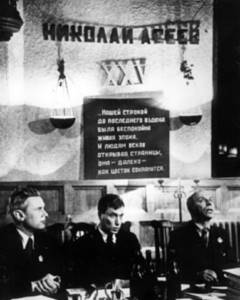
From left to right: Secretary of the USSR Writers' Union Alexander Fadeev, poets Boris Pasternak and Nikolai Aseev. 1939. Moscow. Photo: pastornak-trust.org
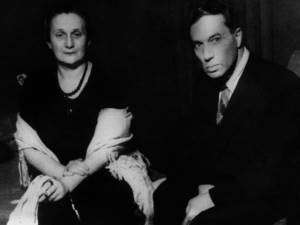
Poets Anna Akhmatova and Boris Pasternak at an evening at the Polytechnic Museum. 1946. Moscow. Photo: V. Slavinsky / diletant.media
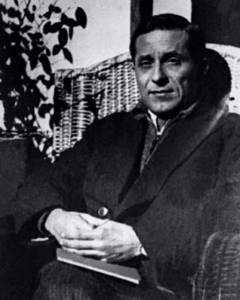
Writer Mikhail Zoshchenko. 1947–1949. Photo: State Literary Museum, Moscow
Alexander Fadeev rewrote The Young Guard in the evenings. During the day, he worked at the USSR Writers' Union: he organized congresses and conferences, proofread new works and evaluated the work of authors. Fadeev participated in all campaigns against “undesirable” writers. In 1946, according to the Decree of the Organizing Bureau of the CPSU Central Committee “On the magazines “Zvezda” and “Leningrad”, he expelled Anna Akhmatova and Mikhail Zoshchenko from the Union of Writers. In September of the same year, during a speech at the presidium of the board of the Writers' Union, Alexander Fadeev accused the poet Boris Pasternak of “idealism alien to Soviet society.” In 1948, the writer ordered the destruction of the entire circulation of his collection “Selected Poems.”
However, at the same time, Fadeev obtained housing and a pension for Anna Akhmatova and tried to release her son from prison. And in conversations with his friend Ilya Ehrenburg, he admired Pasternak’s poetry and read his poems by heart. In the book “People, Years, Life,” Ehrenburg wrote: “In conversations with me, he often spoke lovingly about writers whom he was forced to publicly condemn... This was not hypocrisy, but the drama of a man who gave his whole life to a cause that he considered right.” .
Fadeev personally treated me well, but if he is told to quarter me, he will do it in good faith and cheerfully report on it, although later, when he gets drunk again, he will say that he feels sorry for me and that I was a very good person... His soul is divided into many watertight compartments, like a submarine. Only alcohol mixes everything up, all the bulkheads rise.
Boris Pasternak, poet
Public position. Last years
Standing at the head of the Union of Writers of the USSR, Alexander Fadeev implemented the decisions of the party and government in relation to his colleagues: M. M. Zoshchenko, A. A. Akhmatova, A. P. Platonov. In 1946, after the report of A. A. Zhdanov, which actually destroyed Zoshchenko and Akhmatova as writers, Fadeev was among those who carried out this sentence.
In 1949, Alexander Fadeev became one of the authors of a programmatic editorial article in the Pravda newspaper entitled “About one anti-patriotic group of theater critics”(?), This article served as the beginning of a campaign that became known as “The Fight against Cosmopolitanism.” In the fall of 1949, he participated in the persecution in the press of Boris Eikhenbaum and other Leningrad State University employees.
But in 1948 he tried to allocate a significant amount from the funds of the Union of Writers of the USSR for M. M. Zoshchenko, who was left without a livelihood. Fadeev showed sincere participation in the fate of many writers disliked by the authorities: B. L. Pasternak, N. A. Zabolotsky, L. N. Gumilyov, several times donated money for the treatment of A. P. Platonov to his wife.
Having a hard time experiencing such a split, he suffered from insomnia and fell into depression. In recent years, Fadeev became addicted to alcohol and went on long binges. He underwent treatment at the Barvikha sanatorium.
Ilya Ehrenburg wrote about him:
Fadeev was a brave but disciplined soldier; he never forgot the prerogatives of the commander-in-chief.
Fadeev did not accept the Khrushchev thaw. In 1956, from the rostrum of the 20th Congress of the CPSU, the activities of the leader of Soviet writers were harshly criticized by M. A. Sholokhov. Fadeev was not elected a member, but only a candidate member of the CPSU Central Committee. Fadeev was directly called one of the perpetrators of repression among Soviet writers.
After the 20th Congress of the CPSU, Fadeev’s internal conflict escalated to the limit. He confessed to his old friend Yuri Libedinsky: “My conscience torments me. It’s hard to live, Yura, with bloody hands.”


